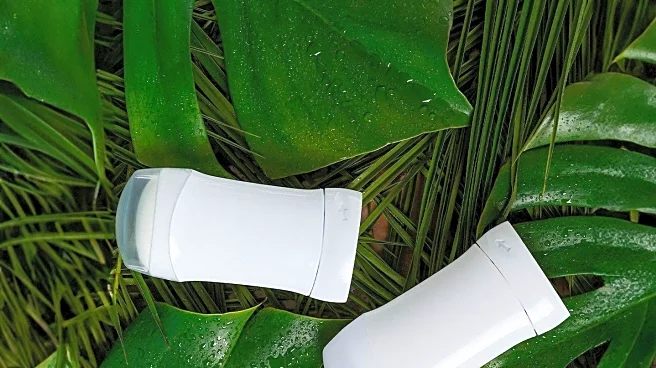What's Happening?
Natural deodorants are experiencing a surge in popularity in the United States, driven by a growing consumer preference for non-chemical, gentle alternatives. Products like Courteney Cox's Homecourt Room Deodorant, which utilizes ingredients such as zinc ricinoleate, yeast ferment, and charcoal, are designed to neutralize odor molecules. Similarly, Lume's whole-body deodorant has reported significant sales, reflecting a broader trend towards natural and effective deodorant solutions. This shift is occurring alongside a rise in the fragrance market, with perfumes and related products becoming the fastest-growing category in the beauty sector. The increased interest in whole-body deodorants is partly attributed to heightened olfactory anxiety, a phenomenon that some experts believe may be a delayed effect of the COVID-19 pandemic. As people became reacquainted with social interactions post-lockdown, normal body odors, previously unnoticed, have become more prominent, leading to a heightened awareness and concern about personal scent.
Why It's Important?
The growing popularity of natural deodorants highlights a significant shift in consumer behavior and preferences within the U.S. beauty and personal care market. This trend reflects a broader societal movement towards health-conscious and environmentally friendly products. The rise in olfactory anxiety and the subsequent demand for whole-body deodorants suggest a cultural shift in how Americans perceive and manage personal hygiene. This could have implications for the beauty industry, potentially driving innovation and the development of new products that cater to these evolving consumer needs. Additionally, the trend underscores the impact of the pandemic on consumer behavior, as individuals seek to regain control over their personal environments and appearances in uncertain times.
What's Next?
As the demand for natural deodorants continues to grow, companies in the beauty and personal care industry may increase their focus on developing and marketing products that align with consumer preferences for natural and effective solutions. This could lead to further innovation in product formulations and packaging, as well as increased competition among brands seeking to capture market share. Additionally, the trend may prompt further research into the psychological and cultural factors driving olfactory anxiety and its impact on consumer behavior. As awareness of these issues grows, there may be a broader societal conversation about the role of scent in personal identity and social interactions.
Beyond the Headlines
The rise of natural deodorants and the associated olfactory anxiety raise important questions about the cultural and psychological dimensions of scent and personal hygiene. The emphasis on eliminating body odor may reflect deeper societal anxieties about control, identity, and social acceptance. As consumers increasingly prioritize natural and non-chemical products, there may be a reevaluation of traditional beauty standards and practices. This shift could also have environmental implications, as the demand for sustainable and eco-friendly products continues to grow. Furthermore, the trend highlights the complex interplay between consumer behavior, cultural norms, and industry practices in shaping the future of personal care.











